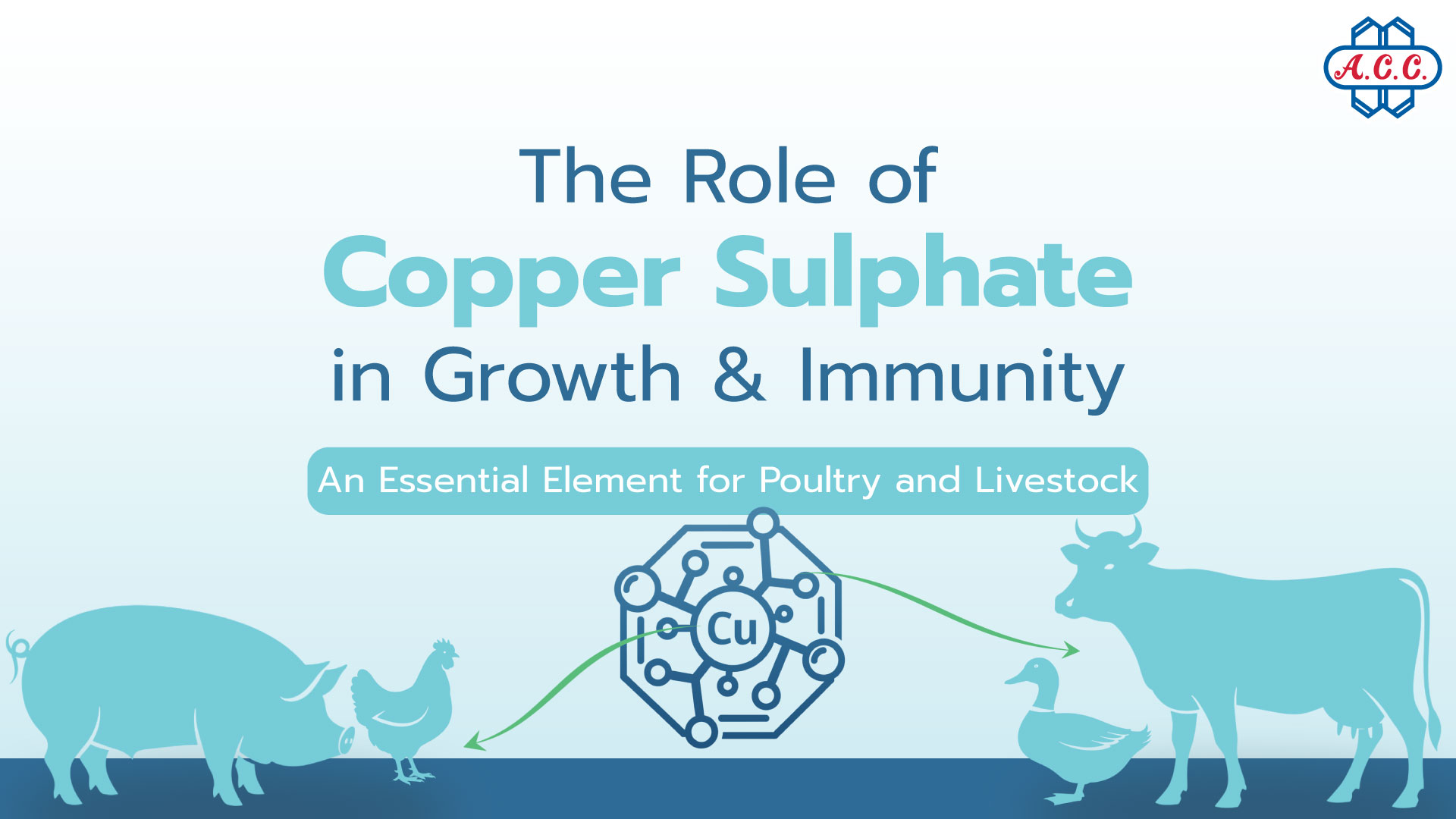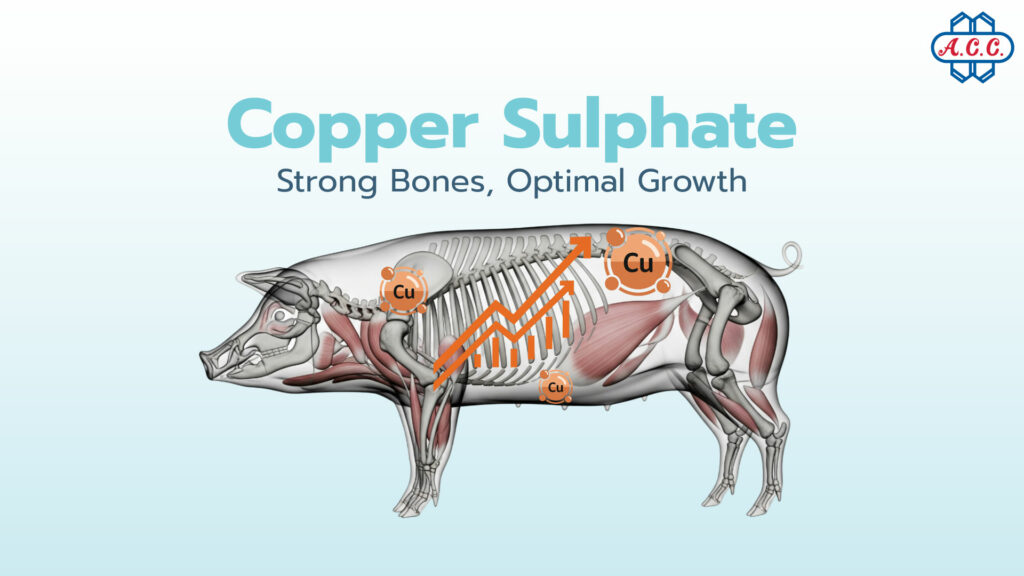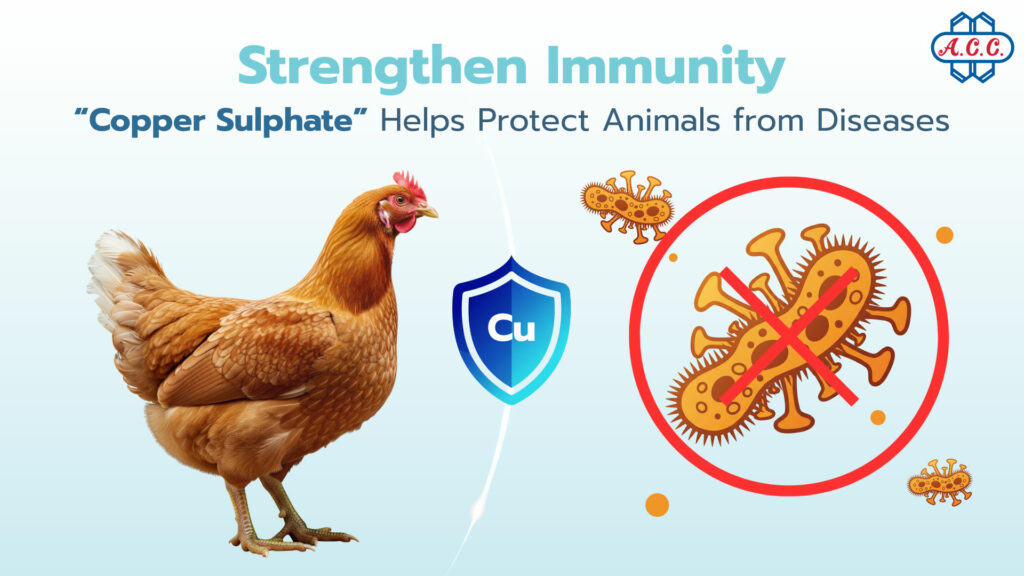
31 Jul Essential Animal Health Tips Your Farm Must Know!
The Role of ‘Copper Sulphate’ in Growth and Disease Prevention in Poultry and Livestock
Why is “Copper Sulphate” more crucial than you think for your farm animals?
In the world of animal farming, whether it’s poultry like chickens and ducks, or livestock like pigs, cattle, and buffaloes, every animal needs complete and balanced nutrients for robust growth and strong disease resistance. But have you ever wondered how vital a tiny trace mineral like “Copper Sulphate” or “Copper” is in maintaining the health and productive efficiency of these animals? Many might overlook this trace mineral, but in reality, copper is a “hero” behind numerous biological processes. This article will delve into the importance of copper and how to maximize its benefits, ensuring your livestock grows to its full potential and stays free from severe diseases.
What is Copper (Copper Sulphate)? And why do farm animals need it?
Copper (Cu) is a metal element we are all familiar with, but in biology, copper is classified as an essential trace mineral that animals need in tiny amounts, yet it is indispensable! It is a vital component of many enzymes that act as catalysts in the animal’s body. Imagine these enzymes as “skilled craftsmen” who diligently build, repair, and maintain various systems to function smoothly. Copper, in this analogy, is the crucial tool that these craftsmen cannot do without.
Within the body systems of animals, be it poultry or livestock, copper participates in almost every critical process, from the cellular level to complex organ systems, from red blood cell formation to immune system maintenance, and most importantly, its role in growth and disease prevention, which we will explore in the next section…
The Heart of Growth: Copper (Copper Sulphate) and Perfect Development
Animal growth doesn’t depend solely on protein or energy; trace minerals like copper play an unexpectedly significant role.

-
Energy Metabolism
Copper (Copper Sulphate) is a cofactor for key enzymes involved in cellular energy utilization. Consider how much energy animals need for growth: whether it’s for movement, muscle building, digestion, or even breathing. Copper helps these processes achieve maximum efficiency, allowing the body to convert nutrients into energy and use it for tissue building to its full potential.
-
Bone & Connective Tissue Formation
Copper (Copper Sulphate) is essential for the synthesis of collagen and elastin, which are the main components of bones, cartilage, tendons, and skin. Strong collagen and elastin ensure animals have a complete body structure, move agilely, and reduce problems with bone and joint abnormalities, especially in fast-growing animals like broiler chickens.
-
Red Blood Cell Formation & Oxygen Transport
Copper (Copper Sulphate) plays a direct role in the synthesis of hemoglobin, a protein in red blood cells that transports oxygen throughout the body. Efficient red blood cell function means sufficient oxygen delivery to various cells, allowing animals to have full energy for growth and activities, preventing anemia that could stunt growth.
Disease Shield: Copper (Copper Sulphate) and a Strong Immune System
In addition to promoting growth, copper also serves as a “shield” that strengthens the animal’s immune system, helping them effectively fight off various pathogens.

-
Immune System Enhancement
Copper (Copper Sulphate) participates in the function of certain immune cells, such as macrophages and lymphocytes, which are the front lines in detecting and destroying pathogens. When the immune system functions well, animals become less susceptible to illness, reducing the need for antibiotics.
-
Antioxidant Properties
Copper (Copper Sulphate) is part of the Superoxide Dismutase (SOD) enzyme, a highly effective antioxidant in the animal’s body. It helps protect cells from damage caused by free radicals resulting from stress, inflammation, or infection. When cells are better protected, animals recover faster from illnesses and have better overall health.
-
Resistance to Certain Pathogens
Some research indicates that appropriate levels of copper may also contribute to resistance against certain pathogens in the digestive tract, which helps reduce the risk of infection and promotes good intestinal health.
Warning Signs of Copper (Copper Sulphate) Deficiency: Don’t Overlook Them!
Copper deficiency in animals can lead to various problems affecting health and productivity. Look out for these signs…
- Stunted Growth: Animals are smaller than normal, not growing according to their age.
- Poor Coat/Skin Quality: Results in rough, pale fur, or unhealthy skin.
- Bone Abnormalities/Weakness: Animals may have bowed legs, difficulty walking, or easily fractured bones.
- Anemia: Leading to pale mucous membranes.
- Weakened Immunity: Animals tend to get sick more often, catch colds easily, and are more susceptible to infections.
- Reproductive Issues: In some species, severe copper deficiency can affect reproduction.
“Copper (Copper Sulphate) supplementation in animal feed: Appropriate dosage is the key to success.”
Now that you understand the importance of copper, the crucial question is, “How can copper (Copper Sulphate) be most effectively supplemented in animal feed?”
-
Forms of Copper
Copper used for supplementation in animal feed often comes in various compound forms, such as Copper Sulphate, which is a widely popular form due to its good bioavailability (ability to be absorbed and utilized) and accessible price.
-
Appropriate Dosage
This is where special attention is required, as copper supplementation must adhere to the specific needs of each animal species and age group. Providing too much can lead to toxicity (Copper Toxicity), while too little will not yield benefits. Farmers should consult with animal nutrition experts, or follow recommendations from academics, veterinarians, and various regulatory standards, to ensure animals receive copper at the most appropriate and safest levels.
Conclusion:
Copper (Copper Sulphate) is a trace mineral of paramount importance for the healthy growth and robust immune system of poultry and livestock. Understanding copper’s significance, recognizing deficiency signs, and supplementing at appropriate levels are key factors for your farm’s success. This ensures your animals maintain good health, reduce susceptibility to various diseases, and sustainably enhance production efficiency. Investing in essential minerals like copper is therefore a worthwhile investment for the well-being of your animals and the profitability of your farm.
Ensure Animal Health with International Quality Copper Sulphate from ACC!
Asian Chemical Co., Ltd. (ACC), as a leading manufacturer and distributor of chemicals, well understands the importance of quality minerals for the livestock industry. We are committed to producing high-quality Copper Sulphate to ensure your animals receive the safest and most effective copper supplementation for health and growth.
Our Copper Sulphate products not only meet animal nutrition needs but are also certified with numerous international standards such as ISO9001, ISO14001, ISO45001, ISO/IEC 17025, FAMI QS, HACCP, and GMP. These certifications are a testament to our commitment to delivering the best products and services to leading customers both domestically and internationally.
For more inquiries or to consult our team:
📞 Tel: +66 (38) 570 150-2 Ext. 106, 107 or +66 (81) 8337 043
📩 E-mail: [email protected]
🌐 Website: https://acc1976.com/th/
🏢 Asian Chemical Co., Ltd.
85/1 Moo 5, Wellgrow Industrial Estate, Bangna-Trad Rd. Km.36, Bang Samak, Bang Pakong, Chachoengsao 24130 Thailand



No Comments